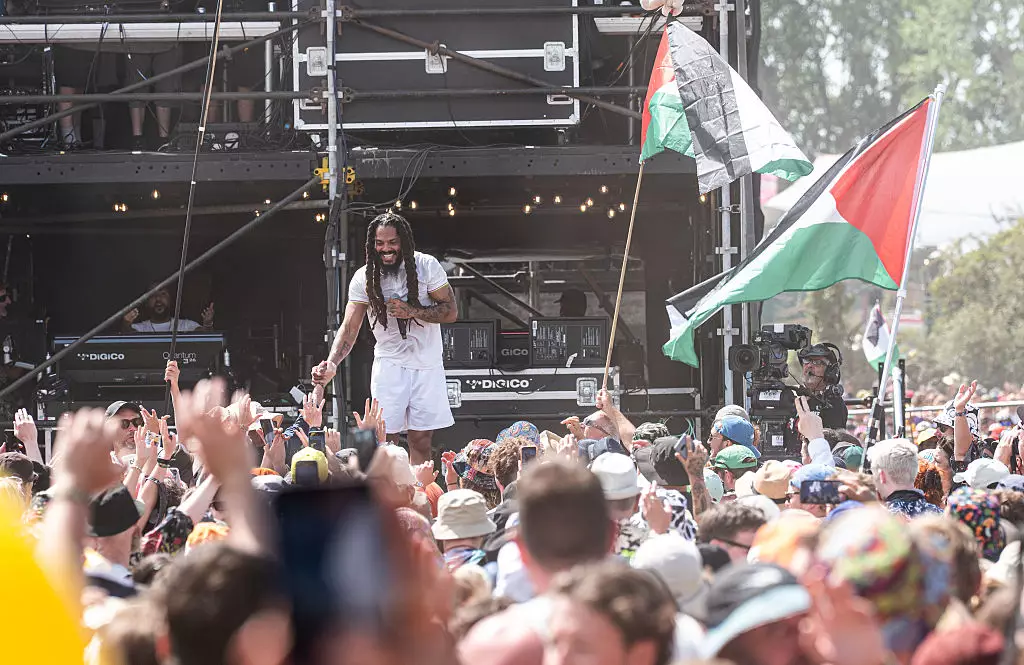The renowned Glastonbury Festival, a quintessential celebration of music and culture, has found itself entangled in controversy once again. The unpredictable marriage of art and politics brewed anew when the English punk duo Bob Vylan took the stage, igniting a discussion that echoes far beyond the festival grounds. Their performance was not just another set in the crowded arena; it was a declaration, a raw expression of dissent against a backdrop of ongoing conflict and human suffering.
The atmosphere at Glastonbury was charged, as thousands waved Palestinian flags and joined the duo in chanting poignant slogans like “Death, Death To The IDF” and “Free, Free Palestine.” These statements resonated deeply, emphasizing a polarized perspective on the Israeli-Palestinian conflict. Bob Vylan’s choice to elevate these themes during their set was an artistic decision, one that catalyzed reactions from both supporters and detractors.
The BBC’s Response: Censorship or Sensitivity?
In a surprising turn of events, the BBC described Bob Vylan’s comments as “deeply offensive,” signaling a level of state-sponsored disapproval that raises important questions about freedom of expression in the arts. The broadcaster made the decision not to make the performance available on demand, a move that suggests a keen sensitivity to audience reception and a potential liability concerning public broadcasting responsibilities.
The BBC’s reaction underscores the precarious balancing act that media organizations must navigate, especially in a politically fraught climate. By labeling the performance as controversial and withholding the footage, they position themselves as caretakers of public discourse, perhaps too cautiously. Critics of the BBC’s decision may argue that censoring this discourse belittles the power of music as a medium for political expression, which has been its essence since the dawn of protest songs.
The Broader Implications: Art as Protest
The incendiary nature of Bob Vylan’s performance did more than just ignite debate between the BBC and a fragmented audience; it sparked a wider conversation about the role of musicians and artists in socio-political discourse. Historical parallels abound; from Bob Dylan’s protest songs during the Civil Rights Movement to modern hip-hop artists voicing grievances against systemic injustices, music has long served as a catalyst for social change.
Bob Vylan’s choice to weave political statements into their performance echoes a rich tradition where artists leverage their platforms to comment on injustice, challenging listeners to confront uncomfortable truths. Yet, with this comes the responsibility of handling their messages thoughtfully, navigating the complexities of their audience’s varied interpretations.
Intersection of Politics and Music: The Case of Kneecap
Add to this already simmering pot the presence of the Irish band Kneecap, who followed Vylan with their own politically charged performance. Their chants against UK politicians, particularly Keir Starmer, and support for Palestine were met with a mixed reception, showcasing the divisive nature of political commentary embedded in art. The band’s legal challenges, including accusations of terrorism-related support, amplify the stakes of their message.
In reflecting on the implications of these performances, it becomes clear that such expressions transcend mere entertainment. They invoke a sense of urgency and accountability, serving as a reminder that art can highlight social injustices and push for change even amid severe backlash.
Public Reaction: A Divided Audience
Reactions to Bob Vylan’s performance have been dichotomous, with condemning voices emerging from conservative political circles alongside applause from supporters and advocates for Palestinian rights. The growing divide between public opinion on crucial political issues is mirrored in social media, suggesting that the chant-laden stage has transformed into a forum for larger societal conversations about morality, justice, and artistic integrity.
With the grim backdrop of violence and humanitarian crises, audiences are forced to confront their own beliefs and values regarding freedom of expression versus solidarity with victims of warfare. This intricate interplay between artistry and advocacy not only enriches the cultural landscape but also ensures that critical issues remain at the forefront of public discourse.
The ongoing discourse triggered by Bob Vylan’s daring performance at Glastonbury encapsulates the potent duality of art and politics, ultimately reflecting a society grappling with profound dilemmas and compassionate calls for justice. In a world fraught with division and turmoil, the power of music emerges as both a refuge and a rallying cry, challenging everyone to reflect and respond.

